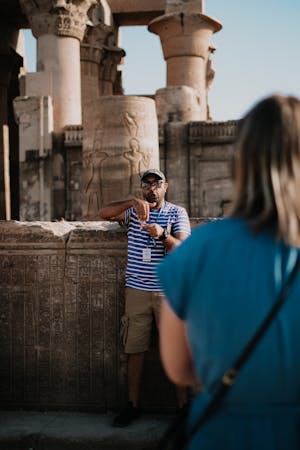Training of guides with hearing impairments
Training of guides with hearing impairments for inclusive cultural tourism
Type of project: Exploratory Research
Disability concerned: Hearing disability
Topics: Equality at work, Education, Participation in cultural life, sports and leisure activities
Status: Completed
The project enabled an exploratory research project to be carried out to understand the habits and needs of people with hearing impairments with regard to cultural activities, in preparation for a training course for deaf museum guides.
Language and cultural barriers limit access to cultural events for people with hearing impairments, mainly due to the lack of content in sign language and qualified interpreters in the cultural field. To address this challenge, our project analysed the needs and barriers faced by people with hearing impairments in enjoying cultural heritage.
We explored visiting habits, pre-visit needs and museum accessibility scenarios by conducting 19 interviews with the deaf community in Ticino and French-speaking Switzerland and establishing contacts with institutions active in deaf education or inclusive cultural tourism.
The research showed that internationally, museum accessibility for people with hearing impairments is increasing, but in Switzerland, and particularly in Ticino, it is still very limited.
People with hearing impairments who visit museums independently seek information via social media and websites, looking for prices and discounts, but rarely expect museums to be accessible and often do not report their deafness.
Although they are interested, their frequency of museum visits is low because of the barriers they face, which further discourages their participation.
One of the main problems is interaction with interpreters, who are often not specialists, which makes the experience tedious and not very interactive, thus limiting learning.
None of the people interviewed had ever visited a museum with a deaf guide, but all agreed that their presence would greatly enhance the experience. The project aims to develop certified training for deaf museum guides, improving accessibility and promoting an inclusive cultural experience.
The team was able to test the importance and effectiveness of actively involving people with hearing impairments in all phases of the project in order to meet their real needs. Thanks to their involvement, we experimented with different ways of conducting interviews (with or without interpreters, often only in Italian sign language), which were always video-recorded, translated and transcribed thanks to the deaf member of the team and his profession as interpreter/translator.
Networking activities and video messages have enabled us to gather authentic information and increase the confidence of respondents. We improved communication with institutions by involving new partners. The Innovation Booster training day strengthened the bonds between project members and clarified project ideas.
The exploratory analysis led to a new funding application for the creation of a prototype training course for deaf museum guides, with university certification. The course will be designed jointly by deaf people, representatives of cultural networks such as Cultura Inclusiva and AMET, and three representatives from the training sector: a member of the ICOM training commission, the University of Geneva, an expert in sign language courses for deaf people, and a representative of the cantonal training scheme for tourist and cultural guides. The University of Geneva is proposed as co-leader for French-speaking Switzerland. The co-design will take the form of a participatory and inclusive workshop.

